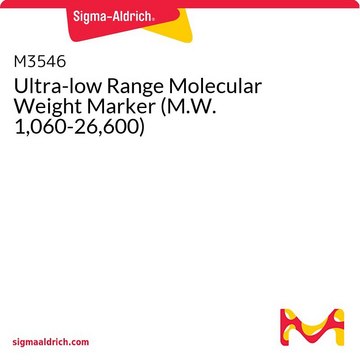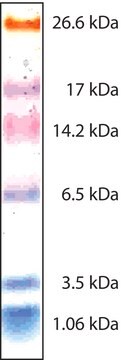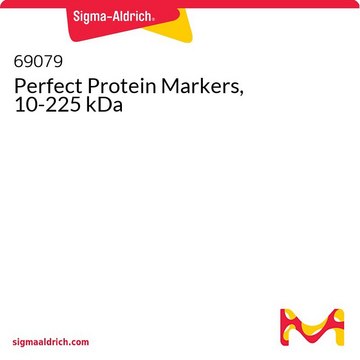C1992
ColorBurst™ Electrophoresis Marker
mol wt 8,000-220,000 Da
Synonym(s):
protein markers, protein molecular weight markers, protein standards
Sign Into View Organizational & Contract Pricing
All Photos(1)
About This Item
Recommended Products
Looking for similar products? Visit Product Comparison Guide
Application
Brilliantly colored, exceptionally well-resolved, convenient, and stable, ColorBurst protein molecular weight markers perform impressively in a variety of gel compositions and concentrations. ColorBurst Markers are composed of 8 polypeptides which have been chemically reduced and conjugated to brilliantly colored dyes. Conveniently, ColorBurst Markers require no resuspension, reduction, or heating prior to use.
Colorburst can be used to estimate sample molecular weights, to monitor the progress of an electrophoretic run, or to confirm that an electroblot is complete.
Components
Solution contains myosin-violet, BSA-red, GDH-blue, ADH-red, Carbonic Anhydrase-orange, Trypsin Inhibitor-blue, Lysozyme-red, Aprotinin-blue, 200 mM Tris, SDS and, formamide. Each lot provides the apparent molecular weights determined by comparison to an unconjugated standard.
Quantity
Each vial of ColorBurst contains 500 μL of solution, enough for at least 50 mini gel applications.
Legal Information
ColorBurst is a trademark of Sigma-Aldrich Co. LLC
Signal Word
Danger
Hazard Statements
Precautionary Statements
Hazard Classifications
Carc. 2 - Repr. 1B - STOT RE 2 Oral
Target Organs
Blood
Storage Class Code
6.1C - Combustible acute toxic Cat.3 / toxic compounds or compounds which causing chronic effects
WGK
WGK 1
Certificates of Analysis (COA)
Search for Certificates of Analysis (COA) by entering the products Lot/Batch Number. Lot and Batch Numbers can be found on a product’s label following the words ‘Lot’ or ‘Batch’.
Already Own This Product?
Find documentation for the products that you have recently purchased in the Document Library.
Yi-Shu Huang et al.
International journal of molecular sciences, 22(4) (2021-03-07)
Epidermal growth factor receptor (EGFR) specific therapeutics is of great importance in cancer treatment. Fcy-hEGF fusion protein, composed of yeast cytosine deaminase (Fcy) and human EGF (hEGF), is capable of binding to EGFR and enzymatically convert 5-fluorocytosine (5-FC) to 1000-fold
Meilyn Rodriguez-Hernandez et al.
Protein and peptide letters, 27(2), 145-157 (2019-10-18)
Glycogen storage disease type III (GSDIII, Cori/Forbes disease) is a metabolic disorder due to the deficiency of the Glycogen Debranching Enzyme (GDE), a large monomeric protein (about 176 kDa) with two distinct enzymatic activities: 4-α-glucantransferase and amylo-α-1,6-glucosidase. Several mutations along
Silvia Carloni et al.
Experimental neurology, 324, 113117-113117 (2019-11-18)
Previous studies have shown that simvastatin (Sim) has neuroprotective effects in a neonatal model of hypoxia-ischemia (HI)-induced brain injury when administered before but not after HI, pointing to the preconditioning (PC)-like effects of the statin. The present study aimed to
Sarah L Teakel et al.
Biochemical and biophysical research communications, 524(1), 64-69 (2020-01-26)
PGRMC1 is a protein from the MAPR family with a range of cellular functions. PGRMC1 has been described to play a role in fertility, neuroprotection, steroidogenesis, membrane trafficking and in cancer cell biology. PGRMC1 represents a likely key regulator of
S V Demyanenko et al.
Molecular neurobiology, 57(7), 3219-3227 (2020-06-09)
Stroke is one of the leading reasons of human death. Ischemic penumbra that surrounds the stroke-induced infarction core is potentially salvageable, but molecular mechanisms of its formation are poorly known. Histone acetylation induces chromatin decondensation and stimulates gene expression. We
Our team of scientists has experience in all areas of research including Life Science, Material Science, Chemical Synthesis, Chromatography, Analytical and many others.
Contact Technical Service









